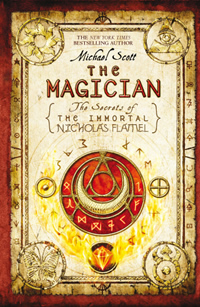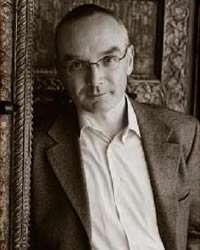 Irish-born Michael Scott is one of The Emerald Isle’s most successful and prolific authors having been published in thirty-four countries and twenty-four languages and now, at a press call in Dublin for the Irish Book Awards, his novel The Magician was short-listed for The Dublin Airport Authority Irish Children’s Book of the Year – senior category, further proof that Michael is one of the world’s leading writers for young people and fantasy fans.
Irish-born Michael Scott is one of The Emerald Isle’s most successful and prolific authors having been published in thirty-four countries and twenty-four languages and now, at a press call in Dublin for the Irish Book Awards, his novel The Magician was short-listed for The Dublin Airport Authority Irish Children’s Book of the Year – senior category, further proof that Michael is one of the world’s leading writers for young people and fantasy fans.
He began writing over twenty-five years ago and now has more than 100 titles, for adults and young adults, to his credit. They include Fantasy and Science Fiction, but Michael is also an authority on the folklore of the Celtic lands and is credited with the resurgence of interest in the subject in the mid-1980’s. His collections, Irish Folk and Fairy Tales, Irish Myths and Legends and Irish Ghosts and Hauntings have remained continuously in print for the past twenty years and are now included amongst the definitive and most-quoted works on the subject.
The Magician is the second of a ground-breaking six part young adult fantasy series following on from the international bestseller, The Alchemist and for film fans, New Line Productions have already optioned the feature film rights to the entire series.
This is the fourth year of the Irish Book Awards and for the first time, this year, the overall winners of the children’s categories will be chosen by a public vote. Fans can vote at http://www.irishbookawards.ie
 SFL: Where did the idea for THE ALCHEMYST and THE MAGICIAN come from?
SFL: Where did the idea for THE ALCHEMYST and THE MAGICIAN come from?
MS: My earliest notes for the series which ultimately grew into the Immortal Nicholas Flamel date back to May 1997. Unusually (because, like most writers, I’ve no idea where the ideas comes from), I can pinpoint, almost to the day when the idea solidified into The Alchemyst. It was late September 2000, in Paris, and I had stumbled – entirely by accident – across Nicholas Flamel’s own house in the narrow Rue du Montmorency: the Auberge Nicolas Flamel.
It is interesting, looking back, to see how much of the original idea still remains. I wanted to write a contemporary fantasy, one set very firmly in the present, with modern teenagers as my heroes, characters who used computers and cell phones, who sent emails and text messages. I then decided that I wanted the heroes and villains of the story to be drawn from history, myth and legend. It allowed me to introduce characters like Nicholas Flamel and John Dee, real men who had an extraordinary influence on their time. Just everything I write about them in The Alchemyst is drawn from the historical records.
All-in-all, it would have been easier to make it up – though not half as much fun!
SFL: Can you tell us how you became familiar with the legend of Nicolas Flamel?
MS: I was introduced to the character of Flamel through Doctor John Dee. I had written a couple of novels which featured Dee as a secondary character before I finally decided that he needed a book to himself (The Merchant Prince.)
Dee was exceptional man; he was a mathematician and geographer, astronomer and astrologer and also part of the Queen’s network of spies. Shakespeare is reputed to have modelled the character of Prospero in The Tempest on Dee. Dee was also an alchemist and included in his enormous library were the writings of one of the most influential alchemists of the previous century, Nicholas Flamel.
Nicholas Flamel was one of the most famous alchemists of his day. He was born in 1330 and earned his living as a bookseller – as an aside, I’ll mention that I worked as a bookseller for 25 years, so that completely endeared him to me – and one day he bought a book, the same book mentioned in The Alchemyst, the Book of Abraham. It too, really existed and Nicholas Flamel left us with a very detailed description of the copper-bound book. Although the book itself is lost, the illustrations from the text still exist.
Accompanied by his wife Perenelle, Nicholas spent more than twenty years trying to translate the book. He must have succeeded. He became extraordinarily wealthy and used some of his great wealth to found hospitals, churches and orphanages. Perhaps he had discovered the secret of the Philosopher’s Stone, how to turn base metal into gold.
Of course the greatest mystery linked to Nicholas Flamel is the story of what happened after he died and his tomb was found empty. Had Nicholas also discovered that other great mystery of alchemy, the secret of immortality? What writer couldn’t resist a story that combined magical books, an immortal magician, an empty grave and, even more excitingly, had a basis in fact?
SFL: How does the writing process for your adult books differ from the way you approach the writing of your children’s titles?
MS: The plotting process is identical. I plot everything in great detail so I know exactly where I’m going. It also allows me to put in place all the research I need well in advance. I’ve been to all the places mentioned in the Nicholas Flamel series, photographed them endlessly, and if you think that sounds like visiting exotic locations using “research” as an excuse, then you’re right!
Once the research is complete, I can then write without interruption. The main difference I’ve found with writing for young adults is language. It requires greater precision in expression. Young adults are also a much more attentive audience. Doing a Q&A with a teenage audience can be quite terrifying, more like being interrogated as stories, characters, scenes and situations are dissected.
SFL: What would you like young readers to take away from the reading of THE ALCHEMYST and THE MAGICIAN?
MS: I would be thrilled if it encouraged people to check out some of the amazing stories which exist in the world’s mythologies and legends. The response to The Alchemyst has been astonishing. I’ve had countless emails from readers who went online (as Josh in the book does) and checked out the characters and creatures, and discovered that they once existed. Readers can then discover a back story to just about all the characters, a story that was written hundreds of years before I borrowed that character for my books.
